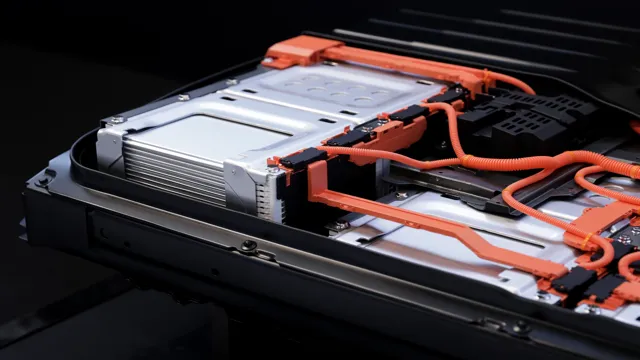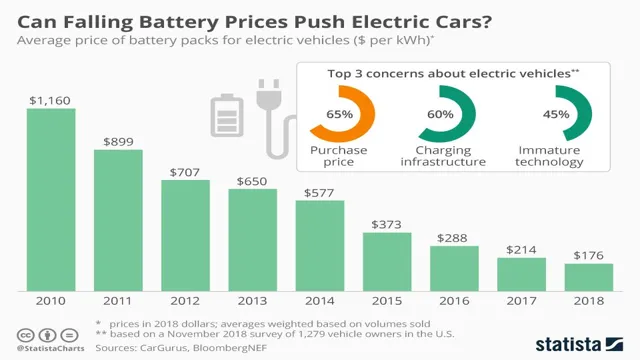Shocking Truth Revealed: Do Electric Car Batteries Pose a Health Risk?
If you’re considering purchasing an electric car, you might be thinking about the benefits of having a more sustainable and environmentally-friendly vehicle. However, there’s another aspect of electric cars that many people don’t think about: the batteries. Electric car batteries are responsible for powering the vehicle, but what impact do they have on your health? In this blog post, we’ll explore the potential risks associated with electric car batteries and what you can do to minimize any negative effects.
So, buckle up and let’s take a closer look!
Introduction
Are electric car batteries harmful to your health? This is a common question asked by many people who are considering purchasing an electric car. While electric car batteries do contain some potentially harmful chemicals, the risks to human health are minimal. Most electric car batteries are designed to be safe and reliable, and any potential risks can be minimized by following appropriate safety procedures.
In fact, electric cars are often seen as a safer alternative to traditional gasoline-powered vehicles, which produce harmful emissions that can harm both human health and the environment. So if you’re worried about the potential health risks of driving an electric car, rest assured that they are generally considered to be safe and environmentally friendly.
Explaining the Basics of Electric Car Batteries
Electric car batteries are a crucial component of any electric vehicle. They store the energy needed to power the car’s electric motor. But how do they actually work? Essentially, electric car batteries are rechargeable lithium-ion batteries.
These batteries store energy as electrochemical energy, which is then converted into electrical energy and used to power the vehicle’s motor. One of the main advantages of electric car batteries is that they are much more efficient than traditional gasoline engines. This means that they use less energy to travel the same distance, which can save drivers a significant amount of money in the long run.
Additionally, electric car batteries are much better for the environment, as they produce far less pollution than traditional gasoline engines. As electric car technology continues to advance, we can expect to see even more exciting developments in this area.

Health and the Environment
As humans, we are heavily reliant on our environment for our basic needs such as air, water, and food. However, with the increasing population and industrialization, we have been negatively impacting the environment, leading to a number of health concerns. Air pollution, for example, has been linked to several respiratory diseases such as asthma while contaminated water sources can cause diseases such as diarrhea.
Additionally, deforestation and destruction of natural habitats have led to the emergence of new diseases such as COVID-19, as animals are forced to migrate and come in contact with humans. It is therefore vital that we work towards preserving and protecting the environment for both our sake and that of future generations.
Facts and Studies on Electric Car Battery Risks
Are electric car batteries harmful to your health? This is a common question that arises when you consider the increasing popularity of electric vehicles. The truth is, electric car batteries are not harmful to your health. In fact, studies show that the environmental benefits of electric cars far outweigh the potential risks associated with battery production and disposal.
However, it is worth noting that there are risks involved in the production and disposal of electric car batteries if proper precautions and regulations are not followed. For example, battery production can result in the emission of certain chemicals that are harmful to the environment, but the use of renewable energy sources can significantly decrease the potential risks. On the other hand, proper recycling and disposal of batteries after their lifespan can also decrease any potential harm to the environment.
In conclusion, while electric car batteries are not harmful to your health, it is important to ensure that they are produced and disposed of responsibly to minimize any potential environmental risks.
Overview of Battery Components and Chemicals
One of the concerns often raised about electric cars is the potential risk posed by their batteries. While electric car batteries are generally safe, there have been a few incidents where they have caught fire or exploded. This is because the batteries contain highly reactive chemicals that can cause thermal runaway if they become damaged or overheated.
Lithium-ion batteries, which are commonly used in electric cars, are particularly prone to this. However, the risk of battery fires or explosions is still very low. In fact, statistics show that the incidence of fires or explosions in gasoline-powered cars is actually higher than in electric cars.
That being said, it’s still important to handle electric car batteries properly and to be aware of their potential risks.
Analysis of Health Risks
Electric Car Battery Risks As electric vehicles gain popularity, concerns have been raised about potential health risks associated with their batteries. While numerous studies have explored the risks of gasoline and diesel-powered vehicles, fewer have focused on electric car batteries. However, existing research suggests that electric car batteries may pose certain risks to human health.
For example, lithium-ion batteries, which are commonly used in electric vehicles, contain toxic and flammable substances that can be harmful if released into the environment. Additionally, the manufacturing process for these batteries involves the use of chemicals that can be hazardous to workers. Despite these risks, it is worth noting that electric car batteries have yet to be implicated in any major health or safety incidents, and the benefits of electric vehicles in reducing air pollution and greenhouse gas emissions may outweigh any potential risks.
Ultimately, continued research and regulation will be necessary to ensure that electric vehicles are a safe and sustainable transportation option.
Examination of Studies and Research
Electric car batteries have been a topic of concern for some due to their potential risks. Studies and research have shown that while there are some hazards associated with electric car batteries, they are relatively rare. A study conducted by the National Highway Traffic Safety Administration (NHTSA) found that electric car batteries were not significantly more likely to catch fire than gasoline-powered cars.
In addition, electric car batteries are designed to shut down in the event of a crash, reducing the risk of electrocution. In the rare event of a fire, electric car batteries can be dangerous and more difficult to put out due to the chemicals involved. However, this risk can be mitigated by proper training and equipment for first responders.
Overall, electric car batteries are generally safe and the benefits of electric cars far outweigh any potential risks.
Benefits of Electric Cars to Your Health and the Environment
Many people are concerned about whether electric car batteries are harmful to their health. The good news is that electric car batteries are not harmful as long as they are used and disposed of properly. Electric car batteries are designed to last for many years, so they don’t need to be replaced often.
Additionally, the materials used in electric car batteries are safer and less toxic than those used in traditional car batteries. This means that there are fewer risks associated with handling and disposing of electric car batteries. In fact, electric cars are actually beneficial to your health and the environment.
They emit less pollution than traditional cars, which improves air quality and reduces the risk of respiratory problems. Plus, electric cars don’t require oil changes, eliminating the risk of oil spills and reducing the amount of waste produced by traditional cars. So, if you’re concerned about your health and the environment, consider switching to an electric car.
Negative Externalities of Gasoline Engine Cars
Gasoline engine cars emit harmful pollutants such as carbon monoxide, nitrogen oxides, and particulate matter, which contribute to a wide range of negative impacts on our health and the environment. Fortunately, electric cars provide a cleaner, more sustainable alternative that offers numerous benefits to both our health and the planet. By reducing the amount of greenhouse gas emissions and air pollutants released into the atmosphere, electric cars help improve air quality and reduce the risk of respiratory illnesses.
Moreover, electric vehicles produce significantly less noise pollution than gasoline-powered cars, resulting in a quieter and more peaceful driving experience. Additionally, electric cars require less maintenance and are more energy-efficient than traditional gasoline cars, making them a more cost-effective option in the long run. Ultimately, making the switch to electric cars is a win-win situation, benefiting both our health and the environment.
Positive Effects of Electric Vehicles on Health and Environment
Electric vehicles or EVs are gaining popularity due to their positive effects on both human health and the environment. By reducing the amount of harmful pollutants emitted into the atmosphere, EVs help promote cleaner air and a healthier living environment. This particularly benefits those living in congested urban spaces where air pollution levels tend to be highest.
Additionally, EVs have a lower carbon footprint compared to traditional gasoline-driven cars, contributing to a healthier planet by reducing greenhouse gas emissions. A significant advantage of EVs is their silent operation, which minimizes noise pollution in and around cities. EVs do not generate noise like traditional vehicles, making them ideal for residential areas.
Even though the initial cost of purchasing an EV can be more expensive than a traditional vehicle, the long-term cost benefits are undeniable. With lower fuel and maintenance costs, EVs offer an economical solution in the long term. Switching to an EV not only benefits the wallet but also promotes a sustainable future by reducing the carbon footprint and promoting cleaner air for future generations.
Conclusion
In conclusion, the answer to the question ‘Are electric car batteries harmful to your health?’ is not a simple yes or no. While the manufacturing process and disposal of these batteries can have negative environmental impacts, the actual operation of electric cars themselves pose minimal health risks. And while there may be some concern over the batteries’ potential electromagnetic fields, the overwhelming consensus is that they are not harmful to human health.
So next time someone asks you about the risks of driving an electric car, just remind them that the only thing it’s harming is gasoline’s reputation.”
FAQs
Are electric car batteries harmful to human health?
While electric car batteries contain some toxic materials like nickel and cobalt, they are not harmful to human health when used and disposed of properly. The risk to human health comes mainly from exposure to these materials during the mining and refining processes, which can be addressed through responsible sourcing and recycling practices.
Can electric car batteries cause cancer?
There is no evidence to suggest that electric car batteries can cause cancer. While some of the materials used in battery production, such as cobalt and nickel, have been linked to cancer in occupational settings, the levels of exposure in electric car batteries are much lower and not considered harmful to human health.
Is it safe to handle electric car batteries?
Electric car batteries should be handled with care and only by trained professionals, as they contain high-voltage electricity and potentially dangerous chemicals. However, when handled properly, electric car batteries are safe to use and dispose of.
How are electric car batteries disposed of?
Electric car batteries are recyclable, and many manufacturers have systems in place to collect and recycle used batteries. Recycled battery materials can be used in the production of new batteries, reducing the need for new mining. In some cases, electric car batteries can also be repurposed and used in energy storage systems.




